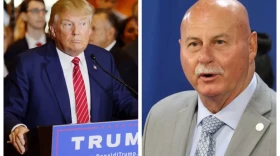This story was originally published by Fresnoland.
A federal judge in San Francisco granted a temporary restraining order blocking the Trump administration from taking federal funding away from the City of Fresno and several other agencies.
The ruling provides temporary relief for several local governments, most of which are in California, from losing federal funding based on conditions unilaterally set by the Trump administration’s executive orders.
Judge Richard Seeborg of the U.S. District Court for the Northern District of California made his ruling from the bench Tuesday afternoon, and said the plaintiffs in the case proved their need for a temporary restraining order.
“I think the uncertainty that has been injected into the (federal funding) process is significant, and I think they’ve shown a likelihood of success on the merits,” Seeborg said of the plaintiffs during the Tuesday court hearing.
The temporary restraining order is only one small step in the case, as the lawsuit’s actual legal arguments have yet to take place. Additionally, Seeborg clarified that the temporary relief would only guard against the conditions on federal funding set by President Donald Trump’s executive orders.
On Aug. 18, the U.S. Department of Housing and Urban Development gave the City of Fresno only three days to purge a city plan of any reference to specific words including equity, environmental justice and transgender. HUD officials also required Fresno to provide assurances that grant funds would not be used to promote “gender ideology” as defined by one of Trump’s executive orders.
Otherwise, federal HUD funding could be taken away from Fresno.
Then on Aug. 22, HUD notified Fresno officials that the city’s plan for how it would use Community Development Block Grant funds was rejected, according to court documents, putting millions in federal funding in jeopardy.
During Tuesday’s court hearing, Ryan McGinley-Stempel, an attorney representing the plaintiffs in the lawsuit, emphasized the immediate and critical nature of stripping federal funding from local agencies based on an executive order.
“Fresno was given, I think, less than three days’ notice to strip certain references from its plan and then subsequently was disapproved on Friday, just two days after filing the lawsuit,” McGinley-Stempel said. “In addition, Sacramento, on August 21, and we attached this to our supplemental declaration, was given September 5 as a deadline to execute its FAA grant agreements.”

Fresno is heavily dependent on a number of federal grants, including the following:
- $100 million in federal transportation grants from the U.S. Department of Transportation
- $11.7 million in housing-related grants from the U.S. Department of Housing and Urban Development
- $2.2 million in environmental safety grants from the U.S. Environmental Protection Agency
Afterwards in the Tuesday court hearing, Trial Attorney Charlie Merritt — representing the U.S. Department of Justice — claimed that pulling federal funds from the local governments and agencies involved would not cause irreparable harm. He also said that Fresno can resubmit its CDBG plan within 45 days to appeal the rejection.
Seeborg asked Merritt to clarify whether the Trump administration would delay pulling federal funding away from local governments in lieu of the new lawsuit.
“If the answer is no, then I don’t see how the plaintiffs can take any solace from the fact that you’re saying, ‘Don’t worry, we’re not going to do anything,’” Seeborg said.
“Well, I can’t speak that broadly, your honor,” Merrit responded. “I also can’t speak to whatever conversation has happened between the court and counsel last week. I came onto the case on Friday, and I’ve had, you know, a very limited amount of time to get familiar and consult with the relevant clients.”
Merritt added that there was no need for a temporary restraining order, and said federal funding is not at risk for any of the plaintiffs.
In a brief statement issued Tuesday, Fresno City Attorney Andrew Janz said he was pleased with Seeborg granting the temporary restraining order.
“The (Trump) Administration placed the City and its taxpayers in an impossible position: either violate the Constitution, accept illegal conditions unauthorized by Congress, and place City staff in legal jeopardy; or forfeit hundreds of millions of dollars of federal grants already appropriated by Congress,” Janz said in his statement.
The seven plaintiffs in the case include the following local government and agencies:
- City of Fresno (California)
- City of Eureka (California)
- City of South Lake Tahoe (California)
- County of Sacramento (California)
- City of Saint Paul (Minnesota)
- County of Monroe (New York)
- Monroe County Airport Authority (New York)
The plaintiffs are represented by San Francisco law firm Renne Public Law Group.
In a new court filing Tuesday morning, attorneys restated what’s at stake for the local governments and agencies involved in the lawsuit.
“The harm here is not just the potential loss of critical federal funds, but being required to attest to compliance with conditions the executive has no legal right to insist upon,” the court filing argued, “which are alternately vague, contradictory, illegal and even unconstitutional.”


